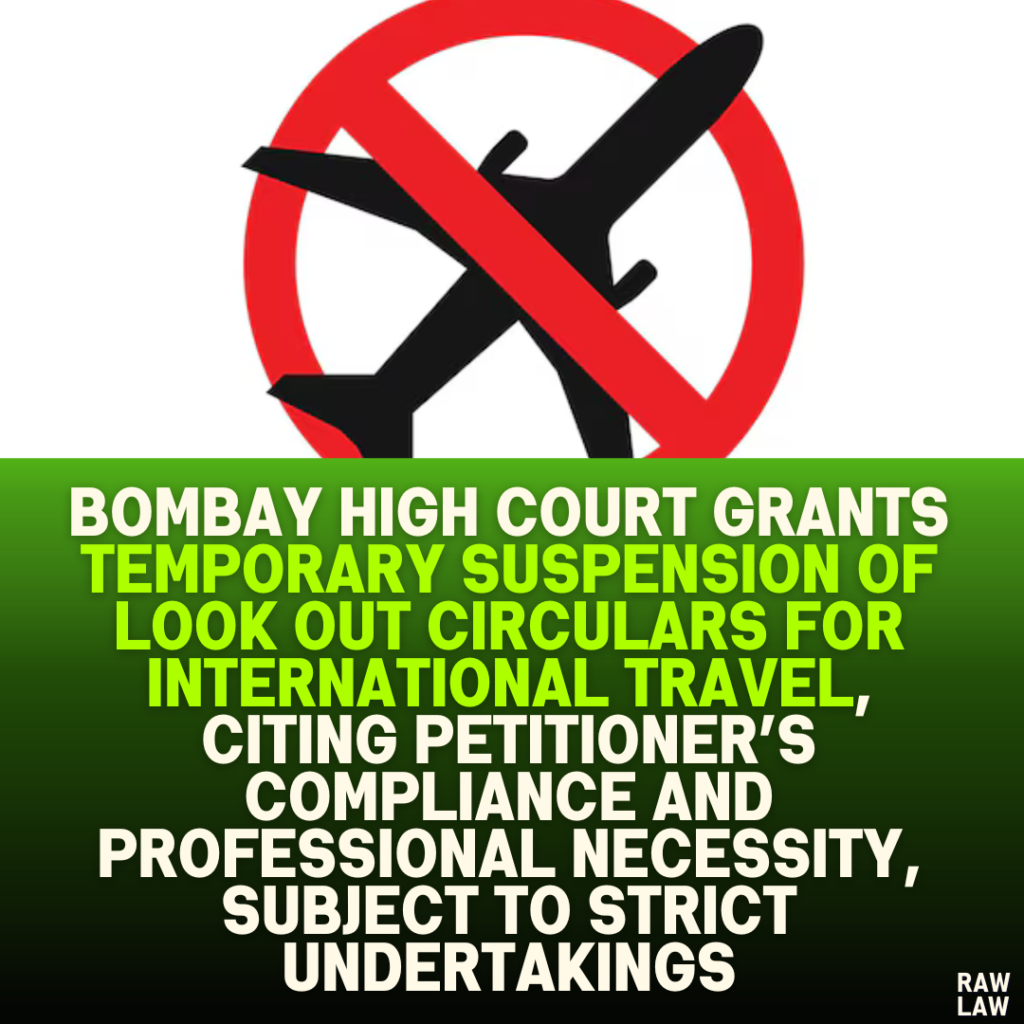Court’s Decision:
The Bombay High Court permitted the petitioner to travel internationally from Mumbai to Lima and Buenos Aires for a conference from November 5 to November 27, 2024, despite Look Out Circulars (LOCs) issued by banks. The permission was granted based on previous compliance with travel conditions set by the court. However, the court emphasized that this suspension of the LOCs is temporary and subject to specific undertakings.
Facts:
The petitioner, facing Look Out Circulars from two banks, sought permission to travel abroad for a conference and workshop in Argentina. He had previously been granted travel permissions with certain conditions, which he adhered to without any reported violations.
Issues:
The primary issue was whether the petitioner could be allowed temporary international travel despite the active LOCs due to his compliance history and for professional purposes.
Petitioner’s Arguments:
The petitioner argued that his compliance with previous travel conditions, as mandated by the court, justified his request to travel for the conference. He assured the court of his intention to return to India post-conference and that the travel was necessary for professional reasons.
Respondent’s Arguments:
The respondent banks raised concerns based on the existing LOCs, referencing their opposition to the petitioner’s previous travel applications and underscoring the importance of his presence in India due to financial obligations.
Analysis of the Law:
The court considered the conditions of LOC issuance and enforcement, emphasizing that LOCs serve as measures to ensure compliance in cases involving financial matters. However, the court acknowledged past travel permissions granted to the petitioner, which highlighted his adherence to the imposed conditions, influencing their decision to allow limited travel.
Precedent Analysis:
The court referenced previous orders granting the petitioner travel permissions, where his compliance had been verified. These prior orders played a crucial role in the court’s decision, as the petitioner demonstrated reliability under similar permissions.
Court’s Reasoning:
The court reasoned that the petitioner’s compliance with all previously imposed conditions, coupled with the professional necessity of his travel, warranted granting a conditional suspension of the LOCs. The court also imposed strict conditions, requiring the petitioner to file undertakings detailing his itinerary, provide updates on his return, and report expenses and business outcomes of his trip.
Conclusion:
The court allowed the petitioner to travel abroad from November 5 to November 27, 2024, but required undertakings concerning his travel details and an affidavit on the conference’s outcomes and expenses upon his return. The LOCs would automatically resume after November 28, 2024, without further extensions unless otherwise requested by the petitioner and reviewed by the court.
Implications:
This decision underscores the court’s balancing approach between enforcing LOCs in financial disputes and considering professional and compliance factors that may justify conditional suspensions. The ruling illustrates the court’s stance on permitting temporary travel under strict monitoring and reinforces the importance of transparency and adherence to conditions in similar cases.




Pingback: Supreme Court Reduces Murder Conviction to Culpable Homicide Due to Absence of Premeditation in Sudden Land Dispute Quarrel - Raw Law